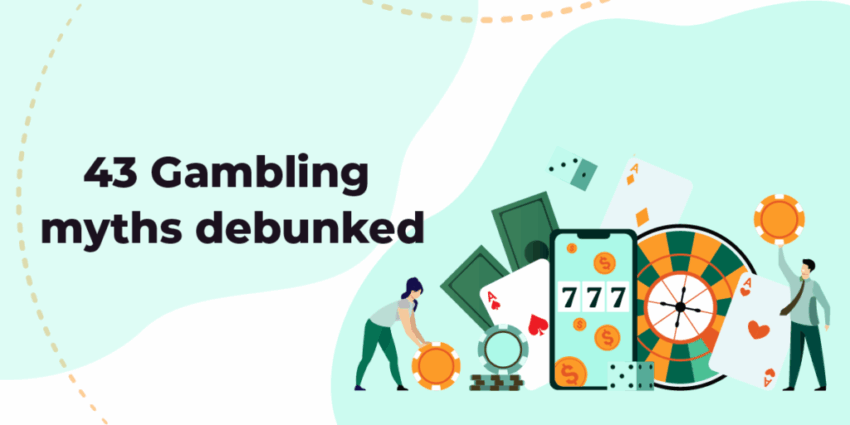Gambling misconceptions abound in a world where the allure of chance meets the complexity of strategy. Many individuals mistakenly believe that luck is the only determinant of success, leading them to overlook the importance of skill-based strategies like poker strategy or the nuances of odds and the house edge. Additionally, the stigma surrounding gambling addiction often leads to the belief that it’s a rare phenomenon, disregarding the serious implications it can have on many players. As we delve into this topic, it’s crucial to dismantle these myths and educate ourselves about online gambling safety, addressing how legal gambling varies across different regions. Join us as we explore the truths behind these gambling misconceptions to foster a more informed approach to this captivating activity.
The realm of gaming often intersects with various fallacies and misunderstandings that can skew people’s perceptions. Terms like gaming myths and betting misconceptions highlight a landscape where many view games of chance as merely about luck, without considering the strategy involved in skill-oriented games. The narrative that gambling hazards are only a concern for a few overlooks the realities of gambling addiction, while many are unaware of the significant role that the house edge plays in their potential returns. In this exploration, we aim to clarify misunderstandings surrounding digital betting safety and the legal aspects of gambling, encouraging a more comprehensive understanding of the broader gambling ecosystem. By clarifying these topics, we pave the way for responsible engagement in this thriving activity.
Understanding Gambling Misconceptions and Their Impact on Players
Gambling misconceptions can shape players’ attitudes and behaviors toward betting, often leading them to make uninformed decisions. One prevalent myth suggests that gambling is merely a game of chance, ignoring the strategic elements present in games like poker and blackjack. Players who believe in this misconception may enter games unprepared, relying solely on luck instead of employing effective poker strategies that incorporate skill and decision-making, ultimately diminishing their chances of success. Understanding the nuances behind these misconceptions not only empowers players but also encourages a more educated approach to gambling.
Furthermore, misconceptions around gambling also intertwine with the issue of gambling addiction. If players underestimate the risks associated with gambling, they might fail to recognize signs of problematic behavior, leading to increased rates of addiction. Misunderstanding the nature of the house edge can exacerbate this issue, as players may hold onto the false notion that they can consistently overcome it with luck alone. Awareness of gambling misconceptions is critical for creating a healthier gambling environment, fostering responsible gambling, and encouraging individuals to seek help when needed.
The Importance of Legal Gambling and Online Gambling Safety
Legal gambling establishes a framework that protects both players and operators by ensuring fair gameplay and promoting responsible practices. The misconception that all gambling is illegal can deter enthusiasts from participating in regulated environments where safety measures are firmly in place. By understanding the legalities surrounding gambling, including the differences between illegal and legally sanctioned activities, players can make informed choices while enjoying their gambling experiences. This knowledge also empowers individuals to participate in legal forms of gambling—like state-run lotteries or licensed casinos—without the fear of legal repercussions.
In the realm of online gaming, safety takes on a new dimension. Critics often argue that online gambling poses greater risks compared to traditional setups due to the ease of access. However, reputable online platforms implement strict protocols to ensure user safety, including encryption technologies and robust customer service measures. Understanding these safety measures not only highlights the potential benefits of online gambling but also reassures players about the security of their personal information. When users are educated about online gambling safety, they can navigate the digital gambling landscape more confidently and responsibly.
Frequently Asked Questions
What are common gambling misconceptions related to gambling addiction?
One prevalent misconception is that gambling addiction only affects a small minority of players. In truth, studies indicate that around 1-2% of gamblers experience severe problems necessitating intervention. Understanding the signs of gambling addiction, such as an obsession with the activity and failed attempts to quit, is crucial. Recognizing these issues helps create a more informed community that prioritizes responsible gambling.
Is it true that the house edge in gambling means players can’t win?
The belief that the house edge guarantees players will always lose is a significant misunderstanding. While the house does have an advantage, particularly in games of chance, players can still achieve considerable wins. Effective strategies, especially in skill-based games like poker and blackjack, can mitigate the house edge. Knowledge and informed betting can enhance a player’s success rate, making it possible to win despite the house advantage.
| Misconception | Reality |
|---|---|
| Gambling is purely luck-based | Skill and strategy play significant roles, especially in games like poker. |
| The house edge means players can’t win | Players can win, especially with informed strategies in skill-based games. |
| Gambling addiction affects only a small fraction of people | About 1-2% of gamblers develop serious problems requiring intervention. |
| You can predict outcomes with patterns | Each gambling event is independent, and outcomes can’t be predicted from past results. |
| Online gambling is riskier than in-person gambling | Regulated online sites may have safeguards that protect users, promoting responsible gambling. |
| All gambling is illegal | Many forms of gambling are legal and regulated, such as state lotteries and licensed casinos. |
Summary
Gambling misconceptions can often lead players astray, clouding their judgment and fostering unrealistic expectations. It’s important to realize that while gambling is associated with chance, strategy and skill can significantly impact outcomes. Understanding these truths can empower individuals to engage with gambling responsibly, making more informed choices. By dissecting the myths surrounding gambling addiction, house edges, and the legal landscape, we foster a more educated community that can enjoy gambling as a thrilling yet responsible pastime.
